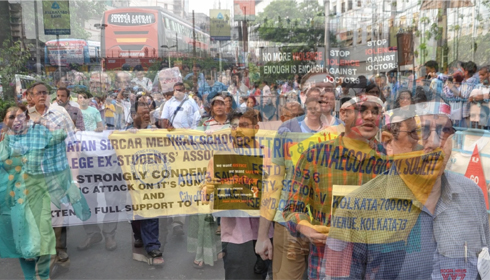
Doctors Protest Against Police Blockades in Lalbazar: A City Under Siege?
In a dramatic escalation of hostilities between junior doctors and Kolkata police, the city's Lalbazar district resembled a besieged fortress, sparking an intensive sit-down protest by medical professionals. The stalemate began when the police built various barriers, some as tall as 9 feet, thereby transforming the area around the police headquarters into a strongly guarded zone.
The protesting junior doctors and supporters have sharply criticised the police's conduct, claiming that the heavy-handed approach is intended to frighten and disrupt their peaceful demonstration. Dr. Kinjal Nanda, a loud protester, expressed surprise at the police's behaviour, asking, "Why is the medical community so terrified of the administration? Where was the administration when this horrific incident transpired on August 9 and again on August 14? Where were the barricades back then? However, several roadblocks are in place to prevent the junior doctors from passing through. The cops are trying our patience, but they are unaware that we have 96 hours of duty experience."
The alleged rape and murder of a female doctor on duty at a government medical institution sparked the demonstration, prompting indignation and calls for justice from the medical community and beyond. The junior doctors are seeking the resignation of Kolkata Police Commissioner Vineet Goyal, accusing him of mishandling the investigation and neglecting to safeguard the safety of healthcare professionals.
Despite the heavy police presence, the junior doctors, together with students and other supporters, have stayed resolute in their protest. "A police representative came to meet us late last night," claimed a protester. "They told us that a delegation of 20 people from us might attend the meeting. However, the cops have not arrived. All we asked for was permission to cross past the intersection of Bentinck Street and this road. They could not accept it. They're quite afraid!"
The cops' unwillingness to allow protestors to approach the Lalbazar headquarters has resulted in a tense stalemate, with policemen on one side of the barriers and protesters on the other. The deployment of a large number of female police officers further intensified the sense of a city under siege.
Junior doctors and their supporters conducted a sit-down protest on BB Ganguly Street in response to the police barricade, despite the intense heat. The demonstrators, many of whom were spotted sitting under umbrellas, have promised not to let up until their demands are realised. The demonstration is already in its second day, with no indications of de-escalation.
Throughout the night, the medics stayed on the streets, demonstrating their determination and endurance. "We work 24 or 36 hours. We're not fatigued. "We are not giving up," one doctor stated, indicating the medical community's desire to get their requests met.
The junior doctors were not alone in their criticism. Students from Rabindra Bharati University and other educational institutions have joined them, spending the night on the streets in solidarity. "The junior doctors have been agitating since day one. There was never any misunderstanding. I'm not sure what it means to have such a large barrier. " What's the fear?" a fan said, doubting the police's motivations.
The demonstrations have also spurred a larger campaign, with the Joint Platform of Doctors, West Bengal, planning a "night occupation" program in at least 30 places around the state. The junior doctors are calling on the public to join them in seeking justice for the victim and responsibility from the government.
As the city and the nation await the next steps in the inquiry, including a vital Supreme Court hearing on September 5, the junior doctors remain steadfast in their call for justice. They have vowed to persist in their demonstration until the police commissioner resigns, engages in dialogue with them, or lifts the blocks, enabling them to reach Lalbazar.
The CBI is now probing the matter under the supervision of the Supreme Court, following claims of corruption and malfeasance in the state government. The next court hearing will help demonstrators and the government recover from this horrific event.
For the time being, the streets of Kolkata remain tense, with the doctors' protest acting as a vivid reminder of the issues that India's healthcare professionals face, as well as the critical need for reform in how the government protects and supports them.